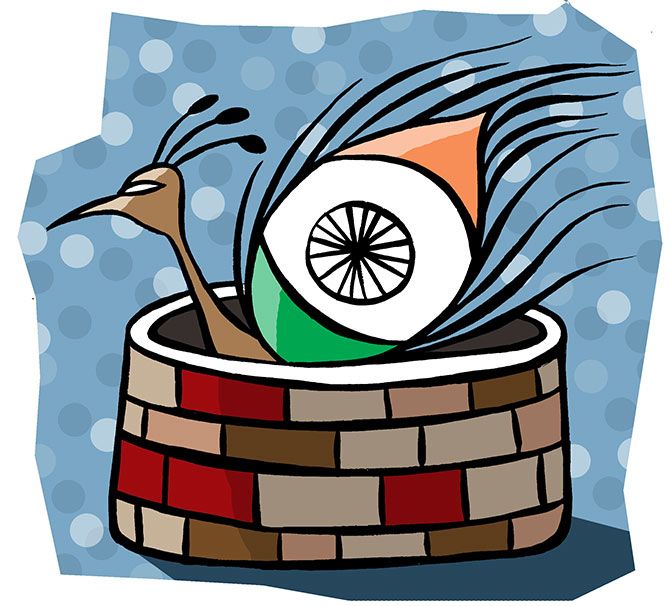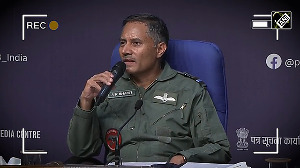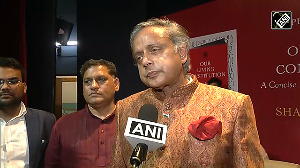'China's deep involvement in the stability and economic and political success of Pakistan actually produces some elements of congruence with India's core interest in a stable and productive relationship with Pakistan.'
'It is not far-fetched for us to pursue that congruence and with ingenuity work out with China a formula that also satisfies our formal position on PoK,' argues Ambassador Kishan S Rana.
Illustration: Uttam Ghosh/Rediff.com

Several weeks ago, at a book discussion in New Delhi, two questioners questioned the author, a former senior official at the ministry of external affairs, on reasons for India not explicitly detailing the strategic objectives of its foreign policy.
The author responded that the key goals, namely support for the country's development objectives and the sustenance of its strategic autonomy, are sufficiently well known to not need elaboration.
While true, the elaboration of policy objectives in an open document has deeper consequences.
Consider the big picture.
The process of articulating foreign policy objectives would generate a national debate of a kind we have not held -- a sustained examination of the country's core external interests, moving beyond old shibboleths, to align these with the country's capacity today to engage in international affairs.
Consider the three countries that present challenges in foreign affairs management -- the US, China and Pakistan -- before turning to other countries and regions.
Pakistan has now embarked on its greatest investment challenge, China's promised $46 billion for the China Pakistan Economic Corridor, the bulk of it through commercial loans.
Around $10 billion will be for the Gwadar-Karakoram road and rail link, while most of the rest will greatly add to power generation capacity, overcoming the shortages that have crippled the economy.
This can be a game changer, if the investment overcomes hurdles such as security threats and project management deficiencies.
We have rightly objected to the violation of our sovereignty, as the Karakoram route traverses Pakistan occupied Kashmir, which is part of Indian Kashmir.
For quasi-landlocked China, access to the Arabian Sea through Xinjiang and Karakoram is the fulfillment of a dream.
But if we look deeper, China's deep involvement in the stability and economic and political success of Pakistan actually produces some elements of congruence with India's core interest in a stable and productive relationship with Pakistan.
In essence, China cannot benefit from Pakistan acting as a hotbed of terrorism, the more so with Xinjiang threatened by the same set of terrorist forces that are directly or indirectly linked with Pakistan.
It is not far-fetched for us to pursue that congruence -- and a related latent parallel in Afghanistan as well -- and with ingenuity, work out with China a formula that also satisfies our formal position on PoK.
Sure, such an approach treads into unfamiliar territory, but that is also in the nature of diplomacy, to apply intelligence to the pursuit of actions that adapt to new situations, moving out of ossified positions.
A further element commands attention.
To our west, the Iranian port of Chabahar is our new lifeline to Afghanistan and Central Asia, and that investment should be pushed through with alacrity. China has a parallel interest in Chabahar as its alternate route of sea access.
To India's east, the Yunnan-Myanmar land corridor to the Bay of Bengal is undergoing rapid development, a road well on the way to completion, and a rail link that would also connect with a projected route all the way to Singapore.
To an extent, that parallels our plans for access to Myanmar and on to Thailand via the trans-Asian road and rail links.
The key point: India has its own stakes in new connectivity corridors both to our west and east. Some of this so obviously parallels China's 'One Belt, One Road' project. Why then should we paint ourselves into a corner by opposing OBOR?
The stakes are too large to allow the Karakoram-PoK traverse as a spoiler, and a further reason to locate a formula that assuages our sovereignty claims.
China is now an important global power. That reinforces the logic we have long practised in our ties with Beijing: Great nuancing and balance in our management of this bilateral relationship.
We simply cannot afford fixation on one or two issues. No one has really explained how membership of the Nuclear Suppliers Group became a core interest for India, more so when we are many years away from becoming an exporter of nuclear equipment.
Surely, our economic interests in China outweigh the NSG issue; we need China as an investor in India, especially in infrastructure (including ports) and in manufacturing capacity, which is of direct interest to China, and would also address our persisting bilateral trade deficit.
Having worked so assiduously to extend this bilateral interface to cover sharing of development experiences in diverse fields, as well as people exchanges and institutional contacts, we must persist in this long-term vision.
The examples of Japan, South Korea and even the US are before us in the management of fraught, complex relationships with China.
Our ties with the US and the Donald Trump administration are clearly on track, but here too, fresh thinking is relevant.
Was it not during the 1999 Kargil clash and the 2002 Parakram standoff (following the attack on Parliament in December 2001) that we accepted facilitation assistance from the US and others, in effect breaching our 'bilateralism' doctrine vis-à-vis Pakistan?
India has to play a more nuanced, multilayered diplomatic game. With the US, China, Russia or others, cooperation continually interweaves with competition, even contestation.
The danger comes from fixated positions.
Beyond these three countries, there are other priority countries and regions. Advancement of a $5 billion credit to Bangladesh, and the identification of another $9 billion worth of commercial deals, is a living example of Prime Minister Modi's 'neighbourhood first' doctrine.
India's essential interests in foreign policy flow from the paramount objectives of underpinning sustained growth to prosperity, plus national security, and ensuring the safety of Indians abroad.
These self-evident core tasks, elaborated in depth via real debate on what our foreign policy can and should achieve, should then cascade into a specific, detailed, and actionable three-level matrix consisting of objectives, goals and targets.
That would direct and motivate diplomatic sub-units, within their own spans of competence.
Ambassador Kishan S Rana is Professor emeritus, DiploFoundation, Malta & Geneva.







